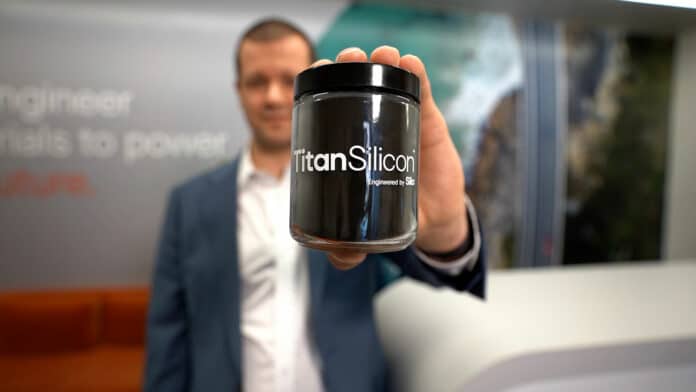For over three decades, silicon has been investigated for use in lithium batteries, but capacity and mechanical decay have traditionally hindered acceptable performance. We’ve seen many silicon battery anode explorations and development works, but most of them have come at the laboratory level.
In a similar effort, American Sila Technologies is working on an anode with a high content of silicon to increase the energy density in electric car batteries. Among other things, the technology has attracted interest from Mercedes, which has invested in the company.
Now Sila Technologies has shown off its high-performance nano-composite silicon (NCS) anode, which they call “Titan Silicon.” It is said to be able to deliver a 20% increase in the range today, which could be up to 100 extra miles for some EVs.
According to Sila Technologies, the range is not the only thing that can be improved by its silicon anode. Titan Silicon can also dramatically improve battery charging time, charging a battery from 10% to 80% in just 20 minutes – even if your charge time is currently as long as 60 minutes. In the future, this time is believed to be reduced to approximately 10 minutes, a standard similar to refilling a gas tank.
In addition, with Titan Sila, automakers can benefit from up to a 15% reduction in battery weight and a 20% increase in space, enabling higher vehicle efficiency and the addition of innovative designs and features.
“Titan Silicon is the highest performing nano-composite silicon in the market today. Our battery and materials teams are constantly iterating and improving upon our chemistry to deliver the best and most cost-efficient results possible,” said Gene Berdichevsky, co-founder, and CEO of Sila. “With the wide adoption of EVs, consumers are looking for best-in-class solutions that deliver best-in-class performance, and our solutions provide just that: longer range and faster charge.”
Titan Silicon is a market-proven, safe, and clean full graphite anode replacement material engineered for mass scale to dramatically boost EV performance and address key consumer pain points. The formula used to engineer Titan Silicon is already in use in the screen-less Whoop 4.0 fitness band.
Sila has optimized its high-performance nano-composite silicon for mass production, which is scheduled to come online in the second half of 2024 in Sila’s facility in Moses Lake, Washington. The company plans to manufacture enough material to power one million EVs in the next five years.
